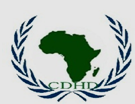From July 19 to August 4 Special Envoy Thomas Perriello’s first official visit as the new U.S. Special Envoy for the Great Lakes Region of Africa brought him to the Democratic Republic of the Congo (DRC), Burundi, Rwanda and Uganda.
Following his tour of the region, he traveled to Paris and London to discuss donor coordination and engagement.
In the DRC, where the United States is the largest bilateral donor, the Special Envoy visited the capital of Kinshasa in the west and Goma in the eastern province of North-Kivu. In Kinshasa, the Special Envoy met with representatives of the Commission Electorale Nationale Indépendante (National Independent Electoral Commission) and other governmental institutions. He also met with representatives of civil society such as Young African Leaders Initiative’s fellows.
During these meetings, the Special Envoy reaffirmed that the United States’ top regional priorities are presidential elections and the respect of constitutions. Pierre Nkurunziza’s contested reelection for a third term as Burundi’s President on July 21, Rwanda’s parliamentary support to a constitutional change allowing for a third presidential term and Uganda’s upcoming Presidential elections in 2016 are among the Administration’s concerns. Furthermore, Local stakeholders and international observers are closely monitoring these two issues as the DRC prepares for Presidential elections in 2016. In recent months, members of the opposition and of civil society organizations denounced maneuvers by President Joseph Kabila, and the ruling People’s Party for Reconstruction and Democracy (PPRD) political party, to prolong the Presidential term of office beyond constitutional limits. In early January 2015, President Kabila attempted to indirectly maintain the presidency by including an article in the new election law that stipulated the completion of a national census prior to national elections. A census would have taken up to three years and thus would have extended President Kabila’s second mandate well beyond the limits set in the constitution. The DRC Senate ultimately dismissed this article, as a result of deadly protests by Congolese citizens, opposition leaders and activists against this political scheme.
In July, President Kabila’s call for a national dialogue with civil society, religious representatives and political parties to garner consensus on the global election calendar further fueled concerns about his intentions. The main opposition parties remain divided about whether or not to participate. Some recognize the virtue of a dialogue at the national level as a means of resolving disputes regarding the electoral calendar. They also insist on the importance of respecting the DRC’s constitution. Others, joined by civil society organizations and religious representatives, denounce this call for dialogue as being yet another strategy by President Kabila to delay national elections past the expiration of his mandate in 2016 and maintain the presidency.
Regional security was another significant issue discussed during the Special Envoy’s trip, notably during his meeting with representatives of the UN Organization Stabilization Mission in the Democratic Republic of the Congo, in the North Kivu province. Eastern Congo remains afflicted by recurrent waves of violence between local and foreign militias, subsequent humanitarian crisis and human rights violations. The latest major crisis in North Kivu started in April 2012 and remains a destabilizing factor for DRC’s nascent democracy and for the Great Lakes region as a whole.
The announcement of the new Special Envoy’s appointment, five months after the resignation of his predecessor Russ Feingold, and the issues he chose to discuss during his visit are a sign of the U.S. Government’s support for improved governance and security in the region. Increased international attention to DRC’s constitutional and electoral processes provides IRI with an opportunity to further its efforts to enhance government accountability and responsiveness. By pursuing its work with local officials and national parliamentarians the Institute can make a positive contribution to the development of strong democratic and governance practices in DRC.

